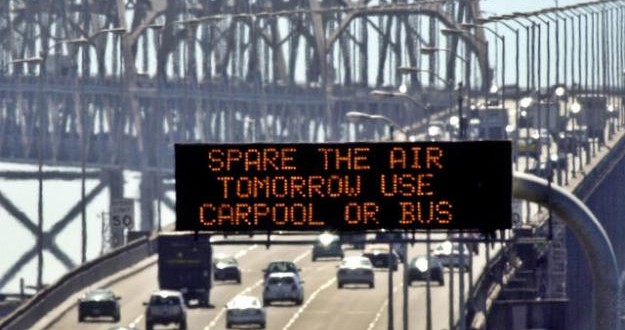The Bay Area Air Quality Management District has issued its first Spare the Air alert of 2014, stating that the combination of high heat and low wind in Monday’s forecast is a recipe for unhealthy air.
In such weather conditions, motor vehicle exhaust accumulates, creating unhealthy levels of ozone pollution. The Air District asks commuters to avoid driving and use alternate modes of transportation while the alert is in effect.
Ozone may cause some people to suffer physical problems from throat irritation to congestion, chest pain and asthma, and worsen bronchitis and emphysema, district officials said.
Richardson said historically, it is unusual for the year’s first Spare the Air day to be this early before June, although the first alerts for 2012 and 2013 came in early May as well.
But the Bay Area’s air has been getting cleaner over the last 20 years, Richardson said.
There were only six “Spare” days last year, 10 in 2012, eight in 2011, 10 in 2010 and 14 in 2009, compared to a high of 23 in 1998, he said.
“Since (1998), we’ve had under 15 a year,” Richardson said.
Among the reasons for the decline of dirty air days is that cars – the major contributor of ozone from tail pipe emissions – are driving cleaner. Older automobile engines that pollute the most are being phased out, he said.
The district is encouraging motorists to drive less and explore alternatives such as carpooling and public transit to reduce smog.
According to U.S. Census figures, about 37 percent of employees in the Bay Area drive by themselves to work, Richardson said.
Residents are also being asked by the district to avoid using gas-powered lawn mowers and leaf blowers on Spare the Air days. Bay Area residents should reduce their household energy use, refrain from using lighter fluid on the barbecue and avoid using aerosol spray cleaners, paints and hairspray.
Exposure to ozone in the air for long periods can affect lung function in young children and seniors. Those with respiratory and heart conditions are particularly vulnerable, the district said.
Agencies/Canadajournal

 Canada Journal – News of the World Articles and videos to bring you the biggest Canadian news stories from across the country every day
Canada Journal – News of the World Articles and videos to bring you the biggest Canadian news stories from across the country every day

